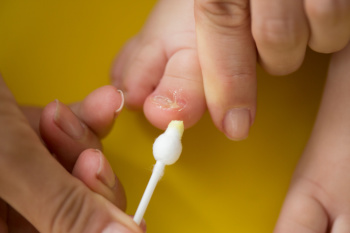
Babies can develop ingrown toenails when the corner of the nail grows into the surrounding skin, often affecting the big toe. Because infant nails are soft and flexible, they may sometimes appear ingrown when they are only curving at the edges. Signs of a true ingrown toenail include redness, swelling, tenderness, and, in some cases, drainage of fluid near the nail. Causes of ingrown toenails include nails being trimmed too short, rounded edges that grow into the skin, or pressure from tight shoes once the baby begins walking. If ignored, an ingrown toenail may lead to infection, making the toe more painful and swollen. A podiatrist can determine if the nail is truly ingrown and provide treatment to ease discomfort, prevent infection, and guide parents on proper nail care as their child grows. If your child develops an ingrown toenail, it is suggested that you promptly schedule an appointment with a podiatrist for an exam and treatment solutions.
Ingrown toenails can become painful if they are not treated properly. For more information about ingrown toenails, contact Timothy Gauldin, DPM of Toe-tal Foot Care. Our practitioner can provide the care you need to keep you pain-free and on your feet.
Ingrown Toenails
Ingrown toenails occur when a toenail grows sideways into the bed of the nail, causing pain, swelling, and possibly infection.
Causes
- Bacterial infections
- Improper nail cutting such as cutting it too short or not straight across
- Trauma to the toe, such as stubbing, which causes the nail to grow back irregularly
- Ill-fitting shoes that bunch the toes too close together
- Genetic predisposition
Prevention
Wearing proper fitting shoes and using proper cutting techniques will also help decrease your risk of developing ingrown toenails.
Treatment
Ingrown toenails are a very treatable foot condition. In minor cases, soaking the affected area in salt or antibacterial soaps will not only help with the ingrown nail itself, but also help prevent any infections from occurring. In more severe cases, surgery is an option. In either case, speaking to your podiatrist about this condition will help you get a better understanding of specific treatment options that are right for you.
If you have any questions, please feel free to contact our office located in Hot Springs, AR . We offer the newest diagnostic and treatment technologies for all your foot care needs.
